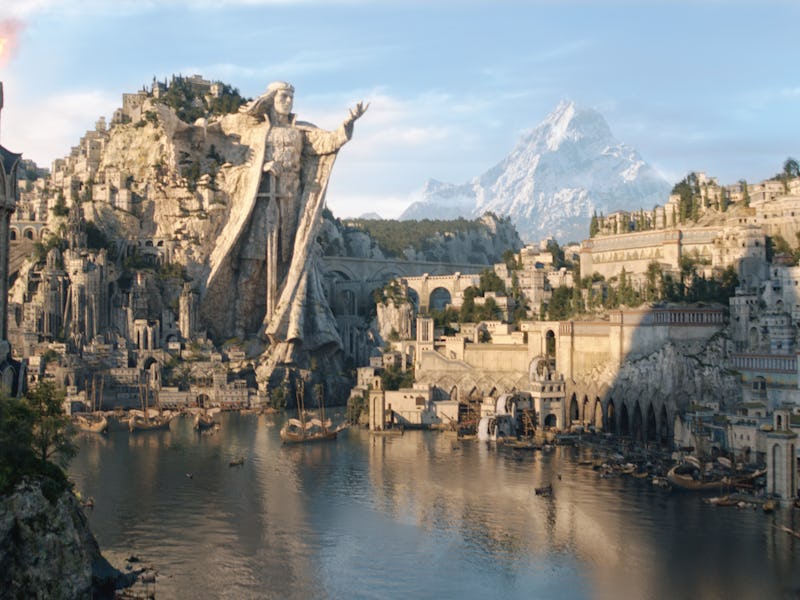Where is Numenor? Rings of Power’s most important location, explained
In its third episode, The Rings of Power finally takes viewers to the legendary island kingdom of Men.

For J.R.R. Tolkien fans, one of the most exciting elements of The Lord of the Rings: The Rings of Power was its promise to finally bring the island kingdom of Númenor to life. However, the Amazon series’ first two episodes chose not to journey to Númenor. That was a surprise to fans, especially considering Númenor’s importance to both the show’s story and the entirety of the Second Age of Middle-earth.
Episode 3 of The Rings of Power, however, gives Tolkien fans the introduction to Númenor they’ve been waiting for. But while Númenor is stunningly well-realized, the episode doesn’t delve too deeply into the kingdom’s history.
Here’s what you should know about Númenor, including its history and the role it’s set to play in The Rings of Power.
A trio of ships sails through the island kingdom of Númenor in The Lord of the Rings: The Rings of Power.
Welcome to Númenor — In the opening minutes of Episode 3, Halbrand (Charlie Vickers) and Galadriel (Morfydd Clark) find themselves on a ship helmed by Elendil (Lloyd Owen), a capable Númenórean sea captain. Elendil takes Galadriel and Halbrand to Númenor and puts them in front of the kingdom’s queen regent, Míriel (Cynthia Addai-Robinson), and Pharazôn (Trystan Gravelle), one of Míriel’s closest advisors.
Galadriel’s first meeting with Míriel doesn’t go well, but the episode effectively establishes Númenor as a powerful and unique — if divisive — location. What fans may not realize, however, is just how important Númenor is to the Second Age of Middle-earth.
Númenor is one of the most powerful kingdoms that J.R.R. Tolkien ever created.
Númenor’s History — During their walk through the streets of Númenor, Galadriel brings Halbrand up to speed on the island kingdom that, as she says, is the “westernmost of all mortal realms.” Unlike Halbrand’s ancestors, who sided with Morgoth in the First Age, the citizens of Númenor are descended from the Edain, the noble Men who fought with the Elves to bring an end to Morgoth’s reign of cruelty.
To honor their efforts and losses, the Edain were given Númenor by the Valar, essentially the angels of Middle-earth. The kingdom was raised from the sea and given to the Edain on the condition that they never sail so far westward that Númenor escapes from view. That would take them towards the Undying Lands, which the Men of Middle-earth are forbidden from visiting.
The island’s first king was Elros, the Half-elven son of Eärendil and twin brother of Elrond (Robert Aramayo). As Galadriel notes, the relationship between the Númenóreans and the Elves of the world was originally strong. When the Númenóreans first began sailing, they even forged an alliance with Gil-galad (Benjamin Walker) and the Elves of Lindon.
Númenor boasts an accomplished navy.
However, the Númenóreans became increasingly prideful and ambitious. While every Númenórean lives considerably longer than the rest of the Men of Middle-earth, it didn’t take long for the island kingdom’s people to begin envying the Elves’ immortality. This led to the creation of two factions: The King’s Men, who wish to leave the teachings of the Valar and the Elves behind, and The Faithful, who want to stay true to Númenor’s roots.
By the time Episode 3 begins, it seems safe to assume that this split between the Faithful and the King’s Men has already existed for a while. Galadriel even remarks that Númenor’s relationship with the Elves soured long ago, which is why she’s received with such hostility.
Charlie Vickers as Halbrand in The Lord of the Rings: The Rings of Power Episode 3.
The Inverse Analysis — The story of Númenor is one of the most important of the Second Age. By introducing important players like Elendil, Isildur (Maxim Baldry), and Pharazôn, The Rings of Power has already done a lot of the work needed to properly set up Númenor’s future triumphs and struggles, of which there are many.
We won’t spoil the details, but Rings of Power viewers should probably try to enjoy the clear majesty of Númenor while they can. It isn’t destined to last forever.
New episodes of The Lord of the Rings: The Rings of Power premiere Fridays on Prime Video.
This article was originally published on